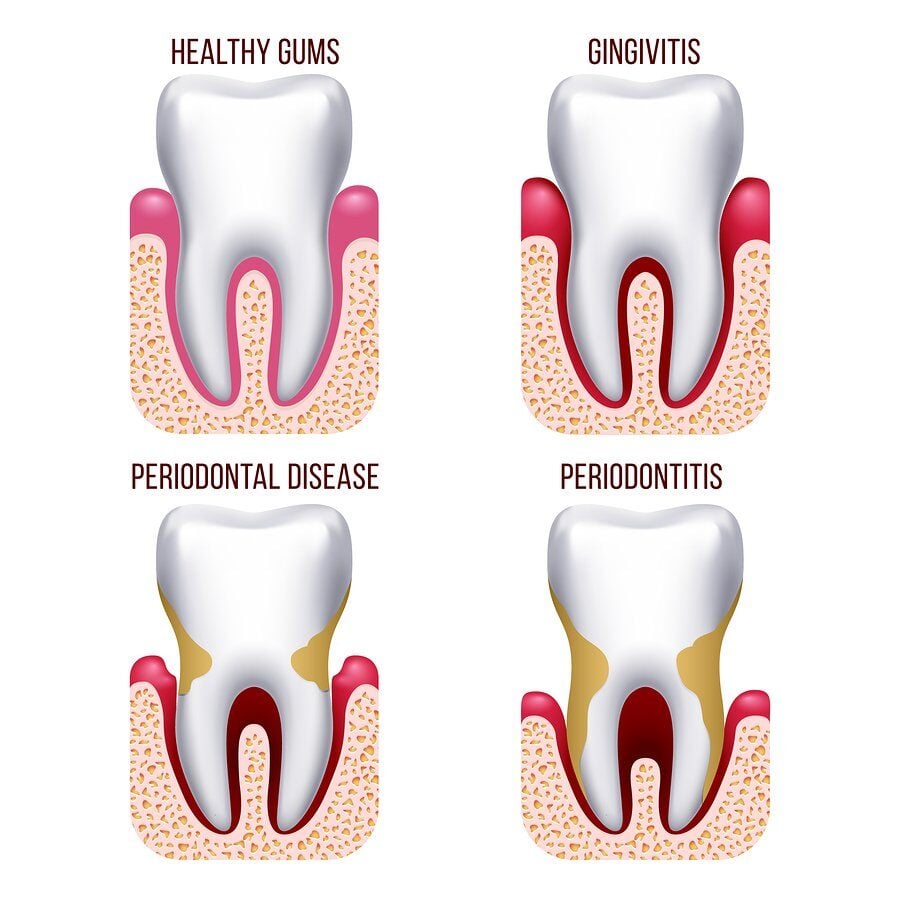Gum Disease: Causes, Prevention, and Care

Summarize with AI
According to the Centers for Disease Control, over half of American adults have gum disease (also known as periodontal disease). Periodontal disease is considered to be chronic, and can lead to tooth and bone loss, and may even contribute to other serious health conditions.
Fortunately, there are many steps that people can take to not only prevent gum disease but to treat and even reverse it in its earliest stages. As with most health conditions, early detection is best and leads to the best outcome for the patient.
Below are some common questions that people have about gum disease:
What is Gum Disease?
Gum disease is an inflammatory oral health condition in which bacteria infects the gums, causing inflammation, bleeding, and possible tooth loss.
What Causes Gum Disease?
Gum disease is caused by the bacteria that live in our mouths. This bacteria can form plaque, which hardens into tartar, irritating gums and eventually damaging teeth, bone, and tissue.
Why do Some People Develop Gum Disease While Others Don’t?
Poor oral health habits are a major culprit, as is tobacco use. Medical conditions, including diabetes, can increase an individual’s risk of developing periodontal disease. Medications can also affect gum health, as can hormonal swings in girls and women during menarche, menopause, and pregnancy. Finally, some people have a genetic disposition to the condition.
Are There Different Types of Gum Disease?
Gingivitis is the mildest form of gum disease. It’s characterized by swollen gums that bleed easily. While gingivitis is often easy to treat, it should never be ignored, as it can lead to a more serious condition.
Periodontitis is the more serious stage of gum infection. At this point, the gums have detached from around the teeth, forming “pockets.” The infection in these pockets eventually compromises the gum tissue, the root structure of your teeth, and your jaw bone.
What are the Symptoms of Gum Disease?
The most common symptoms of gum disease are tender, swollen, reddened gums that bleed during routine brushing and flossing. Other symptoms may include bad breath that doesn’t go away, receding gums, tooth sensitivity, and loosening permanent teeth.
It is possible to have gum disease without any symptoms, although the condition can be identified by your dentist during routine exams. This is why it’s important to see your dentist at least once a year.
What are the Consequences of Gum Disease?
The initial symptoms of gum disease (bad breath, bleeding gums, tooth sensitivity) are often unpleasant, uncomfortable, and embarrassing. Left unchecked, periodontal disease can lead to both tooth and bone loss. Current research also points to potential correlations between gum disease and some chronic health conditions, including heart disease and dementia.
What Types of Gum Disease Treatment are Available?
You may be able to reverse early-stage gum disease through improved oral health habits. Your dentist or hygienist can help you improve your brushing and flossing techniques. Be sure to schedule a follow-up appointment so that your dentist can monitor your progress. If you are a smoker, do your best to quit.
If your condition is more advanced, your dentist can provide you with treatment options. Typically, this involves a deep cleaning by a hygienist using a special tool to remove tartar and bacteria that is accumulated under the gum line and on the roots of your teeth. Antibiotic treatment may also be prescribed.
In very serious cases, oral surgery may be necessary. In addition to removing tartar deposits, you may also have to undergo bone and tissue grafts to repair the damage caused by periodontitis.
Can Kids Get Gum Disease?
Gum disease is most often diagnosed in adults. However, children can and do develop gum disease, particularly gingivitis. Gum disease in children can be the result of poor oral hygiene, but may also be tied to heredity. If you know that gum disease runs in your family, let your child’s dentist know so that he or she can be on the lookout for symptoms.
What do I do if I Suspect I Have Gum Disease?
If you begin noticing symptoms of periodontal disease, such as bleeding when you brush or floss, or receding gums, contact your dentist’s office for advice. If your next routine exam and cleaning are some months away, your dentist may want to see you right away for a consultation. When talking to your dentist, let him, or her know if you are taking any medications or have additional health problems, as these may be contributing to your symptoms.
How Can I Prevent Gum Disease?
The best way to prevent gum disease is to adopt good oral hygiene habits. Adults and children should brush their teeth at least twice a day for two minutes or more. Everyone should floss at least once a day, preferably at bedtime. Adults should undergo a cleaning and exam at least once a year.
Parents can play a major role in the oral health of their children by encouraging regular brushing and flossing at an early age. In addition, parents should also take their children to the dentist for twice yearly checkups and cleanings. Regular professional dental care reinforces the importance of oral health in children and teenagers, who are then more likely to see their dentist regularly when they become adults.
Final Word
In addition to regular brushing and flossing, regular visits to your dentist for a check-up and cleaning are the best ways to prevent gum disease or to catch it in its earliest stages. If you haven’t seen a dentist in awhile, contact your neighborhood Gentle Dental office to schedule an appointment. We offer convenient appointment scheduling options, including weekend and evening hours. We also strive to be gentle on your wallet by offering multiple payment options, including most dental insurance plans, acceptance of major credit cards, discount programs, and financing options.

.png)
